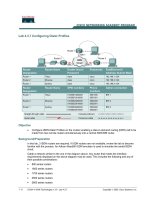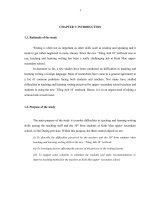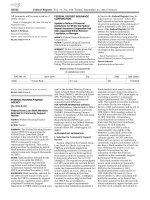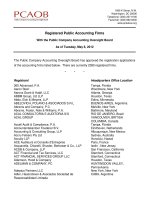UTI final nov2008 This guideline has been registered with the Trust.
Bạn đang xem bản rút gọn của tài liệu. Xem và tải ngay bản đầy đủ của tài liệu tại đây (83.3 KB, 2 trang )
Diagnosis of UTI in Adults - Quick Reference Guide
Version
•
2.0
Date ratified
•
November 2008
Review date
•
November 2010
Ratified by
•
Nottingham Antibiotic Guidelines Committee
Authors
•
•
Tim Hills (Senior Pharmacist Microbiology and Infection Control)
Dr Vivienne Weston (Consultant Microbiologist)
Consultation
Mr John Lemberger (Consultant Urology)
Drs Ivan Le Jeune and Robert Hawkins (Consultants, Acute
Medicine)
• Nottingham Antibiotic Guidelines Committee members
Evidence base
•
•
Local microbiological sensitivity surveillance
Recommended best practice based on clinical experience of
guideline developers
Changes from
previous Guideline
•
Formal assessment of clinical features of UTI added to algorithm.
Inclusion criteria
•
Adult patients where UTI is within the differential diagnosis
Distribution
This guideline will be available on the Trust antibiotics guidelines
websites: http://nuhweb/antibiotics and
/>• Laminated and displayed on appropriate adult wards.
• This guideline will be included in the NUH Formulary update
Local contacts
•
•
•
•
Dr V Weston Consultant Microbiologist
This guideline has been registered with the Trust.
Clinical guidelines are guidelines only. The interpretation and application of clinical
guidelines will remain the responsibility of the individual clinician. If in doubt contact a senior
colleague. Caution is advised when using guidelines after a review date.
Nottingham Antibiotic Guidelines Committee
November 2008
Review November 2010
Authors: Tim Hills, Dr Weston. In consultation with: Mr Lemberger (urology), Drs Le Jeune, Hawkins (Acute medicine)
Page 1 of 2
Diagnosis of UTI - Quick Reference Guide
INTRODUCTION
Dipstick urinalysis with nitrite and leucocyte esterase (LE) provides a useful and quick near-patient-test for the
exclusion of Urinary tract infection (UTI) – 95% negative predictive value (NPV) if both nitrite and LE negative.
However they are slightly less specific with a positive predictive value (PPV) if either one or both are positive
of around 40-60% with random testing, therefore a positive result should be confirmed by microbiological
examination in hospital in or outpatients who are at higher risk of having a complicated or resistant infection
and clinical assessment is also required.
UTI can only be proven bacteriologically in 50% of women with symptoms of UTI, others have inflammation of
the urethra – the ‘so called’ urethral syndrome. Antibiotics do not hasten the clinical response in urethral
syndrome.
In catheterised patients a positive dipstick urinalysis is normal and unhelpful, avoid unnecessary samples
and treatment of bacteriuria, only sample/treat culture result if signs of systemic infection are present.
SUSPECTED UTI:
Patient with suspected UTI, see above for catheterised patients
Dipstick for urine leucocyte esterase (LE) blood, protein and nitrite
Positive nitrite
and/or LE +/- protein,
+/- blood
Possible UTI
Negative nitrite & LE
UTI unlikely (95% NPV)
+/- protein, +/- blood
Does patient have features indicative of UTI?
(dysuria, frequency, new incontinence, loin, flank or suprapubic tenderness)
Yes , send MSU
Does patient have features
indicative of UTI?
(dysuria, frequency, new incontinence, loin,
flank or suprapubic tenderness)
Yes, send MSU
Treat according to UTI or urosepsis
guidance on the antibiotic website
http://nuhweb/antibiotics ,
review with culture results.
Wait for culture result
Only treat empirically if patient has features
indicative of UTI and is septic, (see urosepsis
guidance on the antibiotic website)
No
No evidence of UTI
No
Asymptomatic bacteruria in the elderly is very common. It is not related
to increased morbidity or mortality and giving antibiotics does not
improve outcome. Investigation and treatment will increase side-effects
(including C.Diff infection) and medicalise the condition.
ASYMPTOMATIC BACTERURIA
Asymptomatic bacteruria in the elderly is very common and is not related to increased morbidity or mortality.
Investigation and treatment will increase side-effects and medicalise the condition.
Screening for asymptomatic bacteruria: Screening of asymptomatic bacteruria and treatment if positive is
indicated at least once in early pregnancy and in those who are to undergo urological procedures where
mucosal bleeding is expected e.g. TURP.
References
1. Devillé WLJM et al The urine dipstick test useful to rule out infections. A meta-analysis of the accuracy. BMC Urology 2004 available
from accessed 6.4.2006
2. Patel HD et al, Can urine dipstick testing for urinary tract infection at point of care reduce laboratory workload? J Clin Pathol
2005;58:951-954
3. ISDA guidelines for the Diagnosis and Treatment of Asymptomatic Bacteriuria in Adults CID 2005; 40:643–54
Nottingham Antibiotic Guidelines Committee
November 2008
Review November 2010
Authors: Tim Hills, Dr Weston. In consultation with: Mr Lemberger (urology), Drs Le Jeune, Hawkins (Acute medicine)
Page 2 of 2









